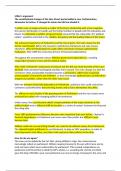Miller’s argument:
The constitutional changes of the later Stuart period added a new, Parliamentary,
dimension to faction. It changed its nature but did not abolish it.
If politics was no longer primarily a matter of the king's relationship with a few magnates,
the uneven distribution of wealth and the limited number of people with the education and
leisure to participate in politics and government ensured that the ruling elite, the 'political
nation', would be restricted to the nobility, the gentry and the leading citizens of the towns.
The enhanced importance of Parliament and the rise of party. The main reason for the
former was financial. Before the monarch could dismiss Parliament and raise money
elsewhere. After the Restoration he could collect only those revenues authorised by
Parliament. After 1689 the crown lost all trace of financial independence.
Throughout the seventeenth century effective government depended on a working
cooperation between crown and the political nation.
After 1660, Parliament's importance increased, but this did not mean that that of the court
declined: their personnel overlapped and they inter-reacted. The main change was that the
Commons' views and possible reactions became a permanent, rather than occasional,
preoccupation of monarchs and ministers, so that increasingly parliamentary considerations
shaped court politics, rather than the other way round.
With the monarch financially dependent on Parliament, politicians who could control the
Commons could effectively deny the king money and so force themselves into office.
The effects on court faction of the growing power of Parliament and the rise of party were
profound but varied with changing political circumstances.
Under James, the court became utterly unrepresentative of the major elements in the
political nation and so failed to fulfil its function as a 'point of contact' between the King and
the ruling elite.
From 1689 parliamentary influences became more important than ever before. Charles II's
financial dependence on Parliament was never more than partial, but William's soon
became total.
William could not run everything himself, nor could he do without money from Parliament.
This allowed English politicians to use Parliament, to play on MPs' prejudices, in order to
force themselves into office, oust their rivals and press their policies on the King
How far do you agree?
This view can be upheld by the fact that, during William’s reign, the crown became
increasingly reliant on parliament. William required money for his war with France and so
took out loans which were underwritten by parliament. This created a dependency on
parliament and forced him to abide by MP’s wishes, i.e. accepting the civil list act which
gave the King £700,000 a year, but parliament was now in charge of paying for the army and




